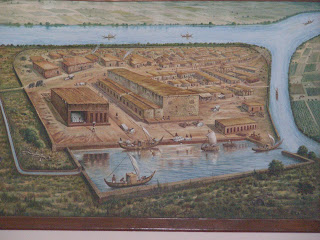The following extract is from the
novel “Kadambari” written by Shri Banabhatta an author who lived in the period
around 645 AD. He was attached to the court of the famous King Harshavardhan. Kadambari
is an epic novel a classic and this extract has been chosen to show that worldly
advise regarding wealth and character remains the same irrespective of the period
and time. In the novel these are the words spoken by the wise minister
Shukanasa to the King Tarapedi’s son Chandrapida on his coronation as the crown
prince.
“Dear Prince,
You have learnt all the sciences
and read all the shastras (scriptures).
But there is much that you have still to learn. The darkness arising from youth
is very thick and cannot be pierced by the sun, nor by the radiance of all the
jewels in the treasury. The intoxication of Lakshmi (Goddess of Wealth) is terrible and does not leave us even in old
age. The blindness of power admits of no cure. The fever of pride does not
yield to any cooling appliance. The poison of the senses is maddening; no
charms or medicinal herbs can counteract it. Passion leaves a stain that cannot
be washed by bathing or purification.
In early youth the mind often
loses its purity even though it is cleansed by knowledge of the scriptures.
Nature carries a young heart before it like a dry leaf borne by the wind. The
senses are captivated by pleasure, as deer are charmed by a mirage.
Beware of Lakshmi, my Prince. She
is fickle and her ways are but little understood. When acquired she is hard to
keep. Even though held fast by the cords of heroism, she escapes. Though
guarded by elephants she flees away. She does not regard race, she does not
follow the fortune of a family, does not consider character, does not count
intelligence, does not court righteousness, does not honour generosity. She has
no use for sacred learning, she does not understand truth, and she does not
value discrimination. Like the hazy outline of an aerial city, she vanishes as
soon as we look upon her. She dwells on
the edge of a sword, as if perpetually engaged in learning cruelty. Like a
creeper she is a parasite, like a river she is full of bubbles, like the sun’s
ray on a cloudy day she rests now on one thing and now on another. She regards
the virtuous as impure, she despises the lofty as unpropitious, she looks upon
the gentle as worthless. She avoids a hero like a thorn, leaps over the
courteous man as if he were a snake, shuns the giver of charities as a
nightmare. She keeps away from the temperate and mocks at the wise. Her ways
are full of jugglery and contradiction. Though creating a fever she produces
also a chill; though rising from water she increases thirst; though of earthly
mould she is invisible; though attached to the highest she really loves only
the base. For the poisonous weeds of desire she is like a fostering shower; for
the deer of the senses she is like the hunters alluring song; for the picture
of virtue she is like the polluting cloud of smoke. Lakshmi is the cataract
filming over the light of wisdom, the lair of the serpent of sin, the
watchtower for the monster of pride, the prologue of the drama of deception.
Under her influence the heart of a king becomes the abode of shameful thoughts.
And remember, my dear Prince, that
success is an uncertain commodity. Sometimes kings are puffed up by their
achievements, and their natures are poisoned as if by an accumulation of
diseases. Moreover, kings are liable to be tortured by the senses which, though
only five in number, turn into a thousand. Pierced by the arrows of Cupid,
kings, already sunk in luxury, are struck down and writhe in their agony. To
make things worse, they are deceived and misled by rogues who hang around them.
These evil companions describe gambling as a relaxation, adultery as a sign of
cleverness, drinking as a necessary pleasure, neglect of the family as freedom
from bonds. To them contempt of a guru’s words is a sign of originality,
disregard of the gods is freedom, flattery is forethought, recklessness is
enterprise, and lack of discrimination is impartiality. Guided by such boon
companions and cheated by their sweet words, kings become conceited and blind.
Though subject to all the limitations of ordinary mortals, they regard
themselves as divine beings. They esteem their glances as a favour and their
words as a glorious blessing to others. Burdened by the pride of their imaginary
greatness, they neglect the gods, slight the teachers, and make fun of the
learned as fools wasting their opportunities of pleasure in useless labour.
They accept a counselor’s skill only in deception and appoint as their family
priests only those charlatans who indulge in magical rites and the like.
My Prince, you must beware of the
fate that overtakes such kings. You must strive never to earn the scorn of your
people or the reproaches of your friends. Do not let wolfish courtiers prey
upon you, nor rogues mislead you, nor women delude you. I know that steadfast
and have been trained for a life of virtue. Yet it is my duty to have warned
you. Now go and enjoy your consecration to kinghood. Bear the yoke which will
be handed over to you, as your forefathers have borne it. Bend the heads of
your enemies and raise the heads of your friends. Crown yourself with glory.”






